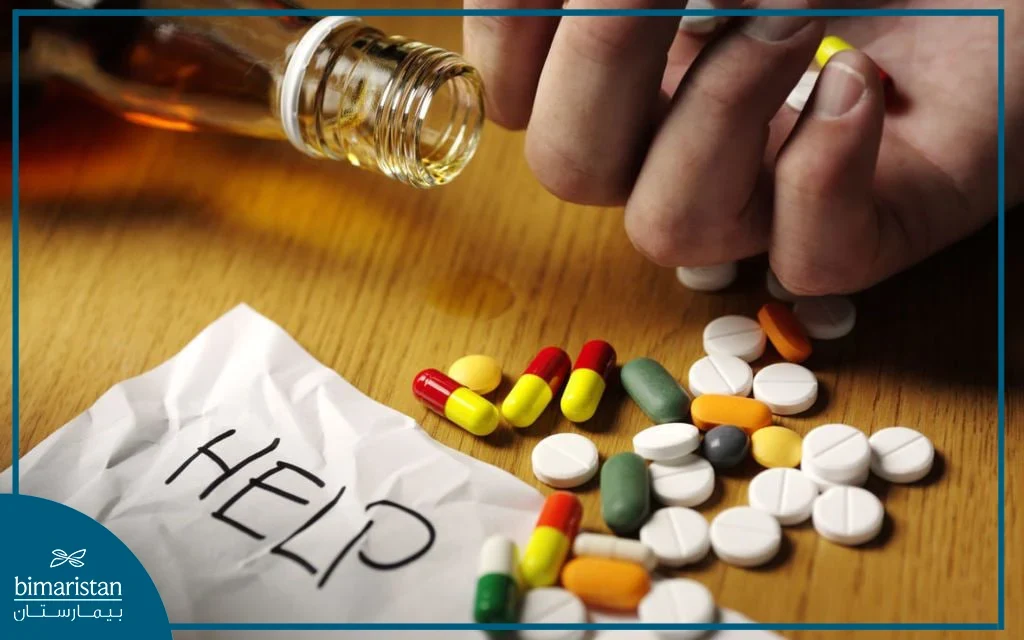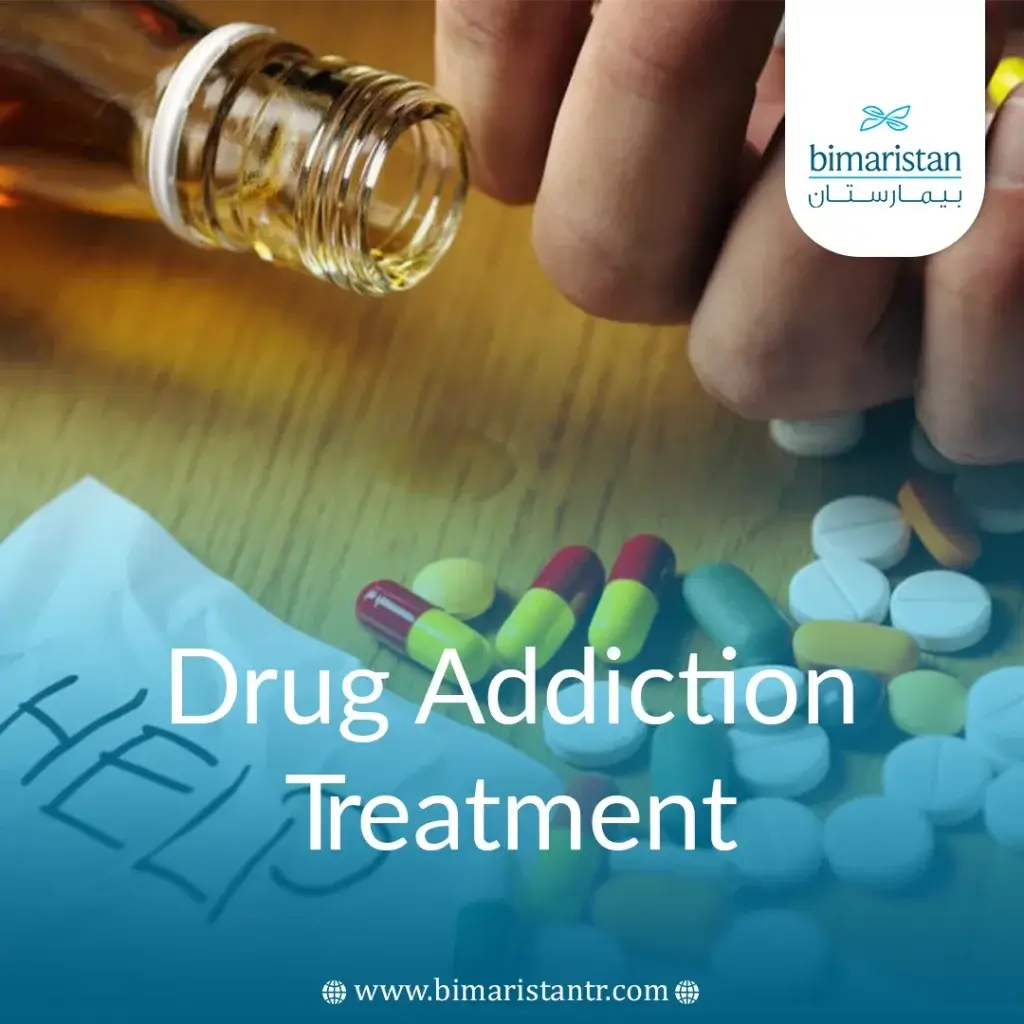Drug addiction is considered one of the prominent health and social issues facing societies around the world. According to statistics published in 2017, expenses for treating drug addiction exceeded $740 billion annually. These expenses are distributed between the costs of care and treatment in addition to crimes related to addiction. To confront this crisis, addiction treatment centers in Turkey offer integrated programs to treat addicts. These programs include medical, psychological, and social aspects aimed at helping patients overcome their addiction and start a new life. If you suffer from an addiction to a certain substance or behavior, there is no need to be embarrassed to ask for help.
According to World Health Organization statistics, more than 240 million people face the problem of alcohol addiction, and about 15 million people suffer from drug addiction. Our medical team can help you choose the best addiction treatment centers in Turkey while offering a special discount to patients wishing to receive the treatment program. Follow this article with us to learn about all the features of the addiction treatment center in Turkey
What is the treatment for drug addiction?
Addiction is defined as the inability to stop doing a certain action even though this action causes physical, psychological, or social harm to the affected person.
This act may include the use of tangible substances, such as smoking, drugs, and alcohol, or another behavioral act that does not involve tangible substances, such as gambling or sex addiction.
In other medical terms, addiction is defined as a chronic functional disorder in the reward or incentive system in the brain, so the affected brain becomes dependent on a specific action to obtain the desired pleasure.
According to a statistical study conducted in 2017 in the United States of America, a person is suffering from drug addiction for every 25 adults.

Signs of a drug addiction
Symptoms of drug addiction that may appear on the addict are:
- Desire to take the drug daily or more than once a day
- Continuing to take the drug for too long
- Buying large quantities of the drug and carrying it with him wherever he goes
- Mood changes such as irritability and quick anger
- Psychological symptoms are observed in the addict, such as depression and anxiety
- Inability to sleep and overthinking (insomnia)
- Sudden behavioral change, such as introversion and social isolation for continuous days
- Lack of interest in oneself and outward appearance
- Urgent need for money to buy the drug
- Sudden weight loss or gain
- Eye redness and pupil dilated or constricted
- Dental and skin problems due to continuous use
These were the symptoms of drug abuse that appear in the addict
The most common types of addictive drugs
There are some drug groups available in pharmacies that may cause drug addiction if used invasively and without medical advice, so drug addiction is not limited only to illegal narcotic substances.
Let’s learn about the most common types of addictive drugs:
Alcohol
Alcohol is one of the most common addictive substances in the event of excessive use. The sources of alcohol vary, the most famous of which are wine and liquor.
Excessive alcohol consumption is accompanied by poor balance and thinking ability, in addition to liver problems. Heavy consumption is defined as consuming more than 4 drinks for a man and 3 drinks for a woman per day.
Benzodiazepine
It is a group of medications used to calm, soothe, and treat psychological disorders such as anxiety and panic attacks.
Opium
It is one of the medicines used to relieve acute or chronic pain and is considered effective if used according to the doctor’s instructions.
Opioids pose a risk of addiction if they are used randomly in high doses, as the opium addict pretends to be called doctor shopping, where the addict visits doctors repeatedly and pretends to be in pain in an attempt to obtain opioids. Some examples of opioids are (morphine, codeine, and tramadol).
Marijuana
As it is known as hashish, it is extracted from herbs, specifically from the cannabis plant, which is dried and rolled up to be smoked. This substance can lead to weak brain function and lung problems.
Cocaine
It is one of the most widely used and most effective narcotic substances. It is usually taken by inhalation, and its side effects include severe weight loss and nasal damage resulting from irritation of the nose by inhalation.
Heroin
It is one of the most powerful narcotic substances on Earth and the most harmful to health. It is derived from morphine and is associated with serious complications and skin ulcers when used for long periods.
Meth
A narcotic and deadly substance whose scientific name is methamphetamine. This element can be manufactured from lithium batteries, and as a result, the manufacture of the substance can be associated with a high risk (a carcinogenic substance).
Sleeping pills
Patients with insomnia use sleeping pills to help them sleep, but if the pills are used excessively and the dose is increased without consulting a doctor, the sufferers may develop a dependence on these pills, so they gradually increase the dose and fall into the trap of addiction to these medications.
Why do people resort to drugs?
Perhaps you may wonder why the addict in the first stage resorts to drug abuse, which puts his life in danger, health-wise and legally.
The first reason that drives a person to begin his story with drugs is the “experience,” meaning that he wants to try the narcotic substance; he wants to experience the feeling of temporary euphoria that these narcotic substances give. Soon, the person turns, after several “experiences,” into a prisoner of this poison. The creep.
Another reason related to starting to use is depression and extreme sadness, which prompts the person to try to escape from the reality in which he lives, to feel the false euphoria or happiness that the drug gives him.
In many cases, an ill-advised prescription, especially one containing opioids, can be the primary cause of addiction. When a doctor prescribes high doses of opioids to a patient for several reasons, the patient may develop a dependence on the drug.
Steps to treat drug addiction in Turkey
The first step in treating drug addiction is to acknowledge the existence of a type of addiction to a particular substance and realize the negative effects that that substance causes on the affected person.
This is followed by the patient’s desire to stop using drugs. When there is a desire and will to quit drugs, treatment methods and steps can be discussed with the patient.
Approach and treatment methods vary according to patients, the substance taken, the severity of addiction, and the degree of response to treatment.
Let us learn about the stages and steps of drug addiction treatment in Turkey:
Detoxification
The detoxification stage is defined as stopping the use of the substance to allow the human body, specifically the liver, to remove the remaining toxins from the effects of the narcotic substance while managing the symptoms of withdrawal of the narcotic substance from the body.
If one stops using a narcotic substance after addiction for a certain period, effects may appear that may be dangerous for the patient. Therefore, a doctor must be consulted before starting to withdraw the substance. We mention the symptoms and effects of sudden withdrawal of the substance:
- Agitation and extreme agitation
- Nausea, vomiting, and severe sweating
- Changes in mood and appetite
- Insomnia and frequent tremors
- In severe cases, symptoms such as hallucinations, epileptic seizures, and delirium may be observed
Psychotherapy sessions in Turkey
Psychotherapy sessions are considered one of the most important methods that help in treating drug addiction in the stage following detoxification. The sessions can be held individually with a psychiatrist who works to motivate the affected person and show solidarity with him on his way to quitting addiction.
The sessions can be in the form of groups so that the patient is encouraged and motivated, forms social relationships with his peers, and realizes that he is not alone in the battle to quit drugs.
Psychotherapy sessions help change the patient’s perception of the drug, give him a dose of attention, and help him avoid returning to his addiction.
The reasons that may lead to a return to addiction (inciters) are discussed for the patient to be avoided. If the patient feels the desire to use when hanging out with his addicted friends, the patient is advised to stay away from them.

Medication treatment
Drug addiction treatment medications, along with psychotherapy sessions, play a role in treating and recovering from drug addiction, as they help alleviate the symptoms of sudden substance withdrawal, help improve mood, and prevent the patient from returning to drug use.
The medications given vary according to the addictive substance. We review together the most important medications:
- Lofexidine: One of the medications used to relieve the patient’s desire and help treat opioid drug addiction.
- Acamprosate: This medication is used to help quit alcohol, as it reduces long-term symptoms of alcohol withdrawal, such as anxiety and insomnia, and improves the patient’s mood during the recovery phase.
Deep brain stimulation
It is one of the advanced techniques in neurosurgery, where a small device is implanted that releases electrical charges to stimulate certain areas in the brain. In the case of treating drug addiction, the areas of the brain responsible for feeling satisfied after taking the narcotic substance can be stimulated. This area is called the nucleus accumbens, which leads to the disappearance of the urgent desire to use drugs.
Rehabilitation programs in Turkey
Long-term rehabilitation programs aim to ensure that the patient fully recovers and re-engages in social life, and they have proven very effective.
There are specialized centers in this field that help the patient who has quit drugs not to return to using drugs again, secure the environment surrounding the patient, and provide the necessary medical and psychological assistance.
Drug addiction treatment centers in Turkey
Turkey is famous for the presence of addiction treatment clinics specializing in treating drug addiction, where the appropriate environment is provided for patients to recover and rehabilitate within communities, and individual or group psychological sessions are conducted that help treat the causes of drug addiction in patients, help them get rid of addiction, and provide them with the necessary support.
Turkish drug addiction treatment clinics are distinguished by providing the latest treatment methods and a team of doctors with experience in treating addicts and helping them in their recovery journey.
You can contact us if you have medical advice about drug addiction treatment centers in Turkey. We at Bimaristan Center guide you to the best-specialized hospitals in all parts of Turkey.
Learn about: Addiction treatment center in Turkey
Drug addiction complications
If the addict does not seek help, drug addiction may be accompanied by many problems and complications, including:
- Involvement in illegal activities such as violence and often theft.
- The spread of infection among addicts due to the use of contaminated injections. The addict may become infected with AIDS or hepatitis.
- The addict turned into a homeless person as a result of selling all his possessions to obtain drugs.
- Carrying out reckless activities, such as driving a car while high after taking drugs.
- Self-harm or suicidal thoughts may ultimately lead to the patient committing suicide.
- Family problems, problems within the workplace, and trouble communicating with people.
Read about: Psychological symptoms of depression
Risk factors that increase the risk of addiction
Everyone is at risk of developing addiction at different ages and circumstances. A rich person may be exposed to drug addiction despite the availability of means of entertainment for him. A poor person may be exposed to drug abuse, despite his poor financial conditions, and may resort to theft to secure these substances.
According to studies, there are a group of factors that may increase the risk of infection in the general population, including:
The presence of a previous family injury
This may be due to genetic reasons and factors that play a role in the mechanism. The presence of a first-degree relative who is addicted to drugs has increased the risk of addiction among his relatives, or the reason may be due to the influence of family members on each other.
Psychological diseases
People who suffer from psychological disorders such as depression, attention deficit disorder, or post-traumatic stress disorder (PTSD) are more at risk of drug abuse and addiction.
Patients resort to narcotic drugs as a way to alleviate their reality, but the situation soon gets worse.
Age
Young people, specifically teenagers, are more at risk of addiction. This could be due to the psychological and hormonal changes and pressures they are experiencing, as well as the ease of influence by their friends and the environment surrounding them.
Poor parental control
Weak bond and relationships between parents and children increases the risk of a young person, specifically a teenager, being exposed to narcotic substances.
High-strength drugs
If a drug with a strong effect, such as cocaine or heroin, is used, the person’s likelihood of addiction increases due to the intensity of the effect of the narcotic substance.
Prisons
Drug abuse is common in prisons, as prison is considered an environment in which drugs are widespread among prisoners. According to studies, one out of every 3 prisoners used drugs at least once during their sentence in prison.
Prevention of drug addiction
The best path to treatment is prevention, and prevention is achieved by staying away as much as possible from these substances and their abuse and from those who promote these substances. If you are surrounded by addicted people who invite you to abuse, stay away as much as possible from them and remember that an ounce of prevention is better than a pound of treatment.
Avoid taking high doses of medication without consulting your doctor, especially painkillers such as morphine or prescription medications that may cause addiction. If you feel the need to take a dose more than the dose prescribed by the doctor, do not hesitate to consult him and talk to him about controlling the dose.
If you are a father and have teenage children, talk to them and maintain a good relationship with them. Sit with your children, communicate well, and explain the danger of engaging in these activities.
Statistics on drug addiction
Many studies around the world have included the negative impact of the problem of drug addiction, including some statistical studies conducted in the United States of America:
- About 20 million adults suffered from a substance use disorder in 2017.
- 74% of people who suffer from drug use and addiction also suffer from alcohol addiction.
- 1 in 8 people suffers from addiction to drugs, alcohol, or both.
- In 2017, 8.5 million Americans suffered from mental illness along with drug addiction and abuse.
- Expenditures for drug abuse and addiction in America amount to more than $740 billion annually, including the costs of drugs, health care, and the cost of crimes related to addiction.
According to the United Nations Office on Drugs and Crime, a quarter of a billion people have used a type of drug at least once in their lives, which is equivalent to 5% of the Earth’s population.
We refer to some numbers for this study published by the United Nations Office in 2015:
- 12 million people use drugs through intravenous injections (needles).
- 1.6 million people who inject drugs are infected with HIV (AIDS).
- 6.1 million people who inject drugs have hepatitis C.
- 1.3 million drug users were infected with AIDS and hepatitis together.
- For people who inject drugs, the number of deaths from hepatitis exceeds the number of deaths from HIV/AIDS.
The negative impact of drug abuse extends not only to the health level of individuals but also to the economic level of countries. Studies indicate that drug abuse has a major role in weakening the economic growth of countries, especially developing countries. Therefore, detection and combating drug promotion are important in improving the quality of life. For the state as a whole.
How long does it take for the brain to recover from drugs?
Full recovery requires a long commitment to treatment and ongoing support, and the individual needs to be surrounded by a strong support system that includes medical and psychological treatment.
It may last for several years. During this period, the brain resets and rebalances its chemistry. This process may take one to two years, more or less, depending on personal factors.
How do I treat myself from drugs at home?
Treating drug addiction at home can be a great and difficult challenge and requires a lot of strength and determination. It is important to know that treatment with specialists is the best option to ensure full recovery.
Teeth of drug users
Drug abuse can have serious negative effects on your oral health. Here are some common effects on drug users’ teeth:
Severe tooth decay
Drugs, such as methamphetamine (meth) and cocaine, cause dry mouth and decreased saliva production, which greatly increases the risk of tooth decay.
Periodontal disease
Drug abuse can lead to severe gum infections, which may cause receding gums and, eventually, tooth loss.
Tooth erosion
Some drugs, such as cocaine and meth, can lead to teeth grinding (bruxism), causing them to wear down over time.
Sources:
